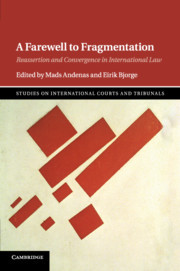Description
A Farewell to Fragmentation
Reassertion and Convergence in International Law
Studies on International Courts and Tribunals Series
Coordinators: Andenas Mads, Bjorge Eirik
Explores the role of the International Court of Justice in the re-convergence of international law.
Language: English
Subject for A Farewell to Fragmentation:
A Farewell to Fragmentation
Publication date: 12-2018
Support: Print on demand
Publication date: 12-2018
Support: Print on demand
A Farewell to Fragmentation
Publication date: 10-2015
604 p. · 15.9x23.5 cm · Hardback
Publication date: 10-2015
604 p. · 15.9x23.5 cm · Hardback
Description
/li>Contents
/li>Biography
/li>
Fragmentation has been much discussed as a threat to international law as a legal system. This book contends that the fragmentation of international law is far exceeded by its convergence, as international bodies find ways to account for each other and the interactions of emerging sub-fields. Reasserting its role as the 'principal judicial organ of the United Nations', the International Court of Justice has ensured that the centre of international law can and does hold. This process has strengthened a trend towards the reunification of international law. In order to explore this process, this book looks at fragmentation and convergence from the point of view of the centre of the International Court and of the position of other courts and tribunals. Featuring contributions by leading international lawyers from a range of backgrounds, this volume proposes both a new take and the last word on the fragmentation debate in international law.
List of contributors; 1. Introduction: from fragmentation to convergence Mads Andenas and Eirik Bjorge; Part I. Reassertion and Convergence: 'Proliferation' of Courts and the Centre of International Law; Section A. At the Centre: The International Court: 2. Unity and diversity in international law Christopher Greenwood; 3. A century of international justice and prospects for the future Antônio Augusto Cançado Trindade; 4. The International Court of Justice and human rights treaty bodies Nigel Rodley; 5. The ICJ and the challenges of human rights law Vera Gowlland-Debbas; 6. Factors influencing fragmentation and convergence in international courts Philippa Webb; Section B. 'Regimes' of International Law: 7. Fragmentation or partnership? The reception of ICJ case-law by the European Court of Human Rights Dean Spielmann; 8. Factors influencing the reception of international law in the case law of the ECtHR's case law: a review Magdalena Forowicz; 9. The influence of the International Court of Justice on the law of provisional measures Cameron A. Miles; 10. Just another case of treaty interpretation? Reconciling humanitarian and human rights law in the ICJ Lawrence Hill-Cawthorne; 11. Fragmentation within international human rights law Mehrdad Payandeh; 12. The European Union's participation in international economic institutions: a mutually beneficial reassertion of the centre Emanuel Castellarin; 13. Reinforcing the ICJ's central international role? Domestic courts' enforcement of ICJ decisions and opinions Veronika Fikfak; Part II. A Farewell to Fragmentation and the Sources of International Law; Section A. Custom and Jus Cogens: 14. The International Court of Justice and the international customary law game of cards Lorenzo Gradoni; 15. State practice, treaty practice and state immunity Alexander Orakhelashvili; 16. Historical sketches of custom in international law Jean-Louis Halpérin; Section B. Treaty Interpretation: 17. Is there a subject-matter ontology in interpretation of international legal norms? Robert Kolb; 18. Halfway between fragmentation and convergence: the role of the rules of the organization in the interpretation of constituent treaties Paolo Palchetti; 19. The convergence of the methods of treaty interpretation Eirik Bjorge; 20. The centre reasserting itself Mads Andenas; Index.
Mads Andenas is a Professor in the Faculty of Law at the University of Oslo, the United Nations Special Rapporteur on Arbitrary Detention, and the Chair of the UN Working Group on Arbitrary Detention, which reports to the UN Human Rights Council and the UN General Assembly. He has held senior academic appointments in the United Kingdom, including as Director of the British Institute of International and Comparative Law, London and Director of the Centre of European Law at King's College London.
Eirik Bjorge is Shaw Foundation Junior Research Fellow at Jesus College, University of Oxford. Eirik has taught at Oxford and Sciences Po, Paris. He is the author of The Evolutionary Interpretation of Treaties (2014) and a co-editor of Landmark Cases in Public International Law (with Cameron Miles, 2017).
Eirik Bjorge is Shaw Foundation Junior Research Fellow at Jesus College, University of Oxford. Eirik has taught at Oxford and Sciences Po, Paris. He is the author of The Evolutionary Interpretation of Treaties (2014) and a co-editor of Landmark Cases in Public International Law (with Cameron Miles, 2017).
© 2024 LAVOISIER S.A.S.




